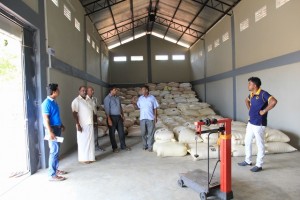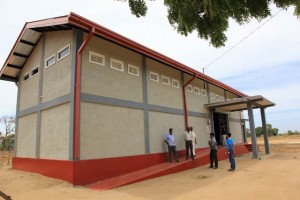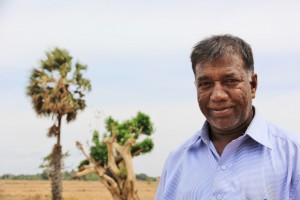Enhancing Agricultural Livelihoods through Community Storage Facilities
Agriculture is an important livelihood in the Northern Province with rice paddy cultivated by a large segment of the population. For rice farmers, storage facilities are vital to store their produce safely. The lack of proper storage facilities in these conflict affected areas have often resulted in poor food security and farmers selling their produce at reduced rates thereby suffering economic losses.
During the past three decades, the Periyaparanthan community faced multiple displacements due to the conflict. Over 400 families were severely affected while their assets including housing and community infrastructure were damaged or destroyed. Following the intensification of the conflict in 2008, the displaced families lived in Internally Displaced Persons (IDPs) Camps in Vavuniya district before returning to their village in 2010.The project for Rehabilitation of Community Infrastructure, Improvement of Livelihoods and Empowerment of Women in the Northern and Eastern Provinces (RCI), funded by the Government of Japan, is supporting the construction of community infrastructure including 13 storage facilities in the North of Sri Lanka. A community storage facility for rice paddy was recently constructed in Periyaparanthan GN Division in Kilinochchi by the project. The RCI project is implemented by UN-Habitat through a participatory process with the community.
This farming community had suffered economic and financial losses making a significant impact to their resettlement process. When the RCI project commenced operations in the village, community consultations were held on major infrastructure needs. The residents collectively identified the construction of a storage facility as a priority need for the area as it directly affected their livelihoods and food security. Before their displacement, farming families had their own storage facility attached to houses which provided adequate storage for their rice harvest. But the conflict had damaged both the houses as well as the storage facilities. Upon their return, farmers were unable to reconstruct the storage as their main priority was to rebuild their permanent homes whilst engaging in agriculture. Although the primary livelihood of Kilinochchi district is agriculture, income generation is quite difficult as both storage and marketing of produce are challenges due to the lack of infrastructure.
During this period, the farmers had access to a storage facility in Kandawali. However, this facility did not not have adequate space for all the produce. Hence, some families stored their harvested paddy and seeds in temporary shelters. This lack of adequate storage has resulted in farmers selling their paddy harvest at very low prices.
The Periyaparanthan Farmer organization represents farmers from Ganeshapuram, Kumarapuram, and Kanjipuram GN divisions. The main role of the farmer organization is to give a voice to the farmers and provide agriculture extension and resource management services. More than 97% of the population in these areas are engaged in paddy cultivation during the Maha cultivation season. Approximately 4,382 acres of paddy lands are cultivated by the members of this Farmer Organisation during “Maha” season and 2,921 acres cultivated during “Yala” season, with an annual yield of nearly 10,224 metric tons.
Following an evaluation of Community Based Organisations in the area, the Periyaparanthan Farmer Organisation was selected as the implementing partner by UN-Habitat to construct the storage facility. In keeping with UN-Habitat’s participatory process of reconstruction, the Farmer Organisation managed the construction process with technical support and supervision from UN-Habitat. The community was involved in the project from the inception to the end of the initiative. LKR.3.7 Mn was provided by the Government of Japan towards the construction of the storage facility.
“I am very happy about this initiative. At the end of the harvest season, farmers face many difficulties due to the lack of storage facilities. So we end up selling paddy at a very low price. This is a terrible waste of all our hard work. This storage facility will certainly help farmers. Now, they will be able to make a profit by selling their rice paddy at a reasonable price.” Mr.S.Victorman, President of the Farmer Organisation stated.The storage facility with a square area of 1,500 square feet was completed in June 2016. The building has been constructed using cement blocks for walls and zinc alumnium sheets for the roof. The walls are high with the roof structure constructed with four steel trusses. The storgae facility can store upto 100 metric tonnes of paddy at a given time. The building has a ramp which provides easy access to the stored products. The entrance to the building is through a roller door. Ventilation is provided by grills located at the top of the walls.
The RCI Project is a community infrastructure development project, contributing towards the sustainable rehabilitation and reconstruction of the conflict affected Northern and Eastern Provinces. Funded by the Government of Japan and implemented by UN-Habitat, it is assisting communities to overcome the hardships caused by the lack of basic services, whilst rebuilding human capital and empowering women. Implemented in the districts of Kilinochchi, Mullaitivu and Mannar in the North and Batticaloa in the East, the key project interventions include the construction of community centres, preschools, storage facilities, small irrigation tanks and the rehabilitation of internal access roads and storm water drainage systems. “I have no words to express my gratitude. I have faced many challenges marketing my produce. We harvest rice with many hopes but the problem is to convert the harvest into cash so that we can settle our debts incurred during cultivation.” a farmer from Periyaparanthan said.



